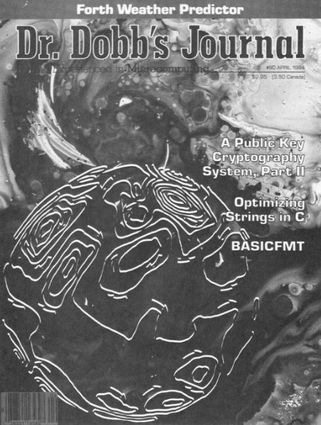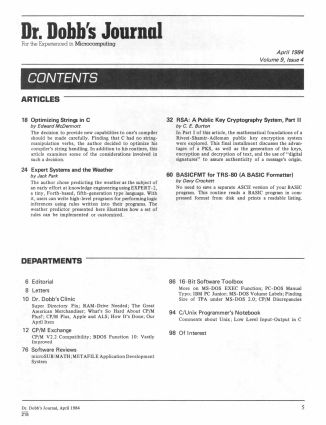
#Edito
TABLE OF CONTENTS
[author : Edward McDermott]
The decision to provide new capabilities to one's compiler should be made carefully. Finding that C had no string- manipulation verbs, the author decided to optimize his compiler's string handling. In addition to his routines, this article examines some of the considerations involved in such a decision.
[author : Jack Park]
The author chose predicting the weather as the subject of an early effort at knowledge engineering using EXPERT-2, a tiny, Forth-based, fifth-generation type language. With it, users can write high-level programs for performing logic inferences using rules written into their programs. The weather predictor presented here illustrates how a set of rules can be implemented or customized.
[author : C. E. Burton]
In Part I of this article, the mathematical foundations of a Rivest-Shamir-Adleman public key encryption system were explored. This final installment discusses the advantages of a PKS, as well as the generation of the keys, encryption and decryption of text, and the use of "digital signatures" to assure authenticity of a message's origin.
[author : Davy Crockett]
No need to save a separate ASCII version of your BASIC program. This routine reads a BASIC program in compressed format from disk and prints a readable listing.
Super Directory Fix; RAM-Drive Needed; The Great American Merchandiser; What's So Hard About CP/M Plus?; CP/M Plus, Apple and ALS; How It's Done; Our April Item
CP/M V2.2 Compatibility; BDOS Function 10: Vastly Improved
microSUB:MATH; METAFILE Application Development System
More on MS-DOS EXEC Function; PC-DOS Manual Typo; IBM PC Junior; MS-DOS Volume Labels; Finding Size of TPA under MS-DOS 2.0; CP/M Discrepancies
Comments about Unix; Low Level Input-Output in C
